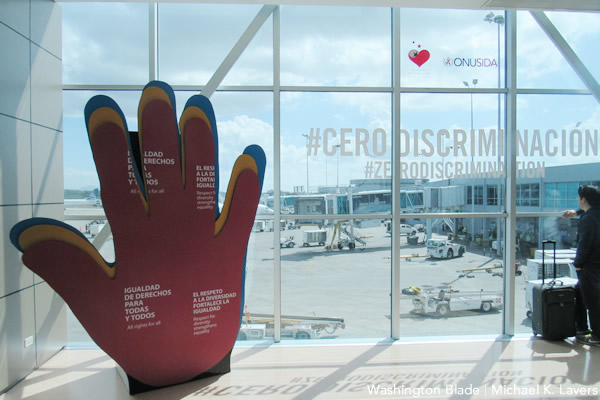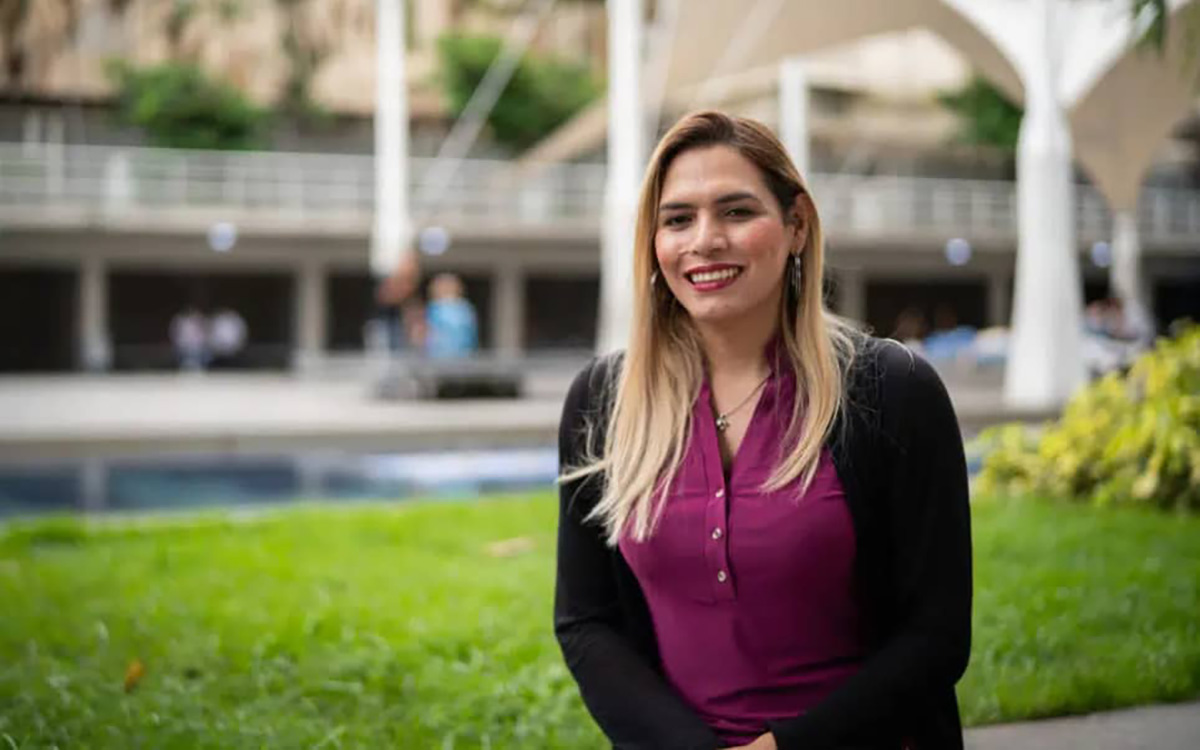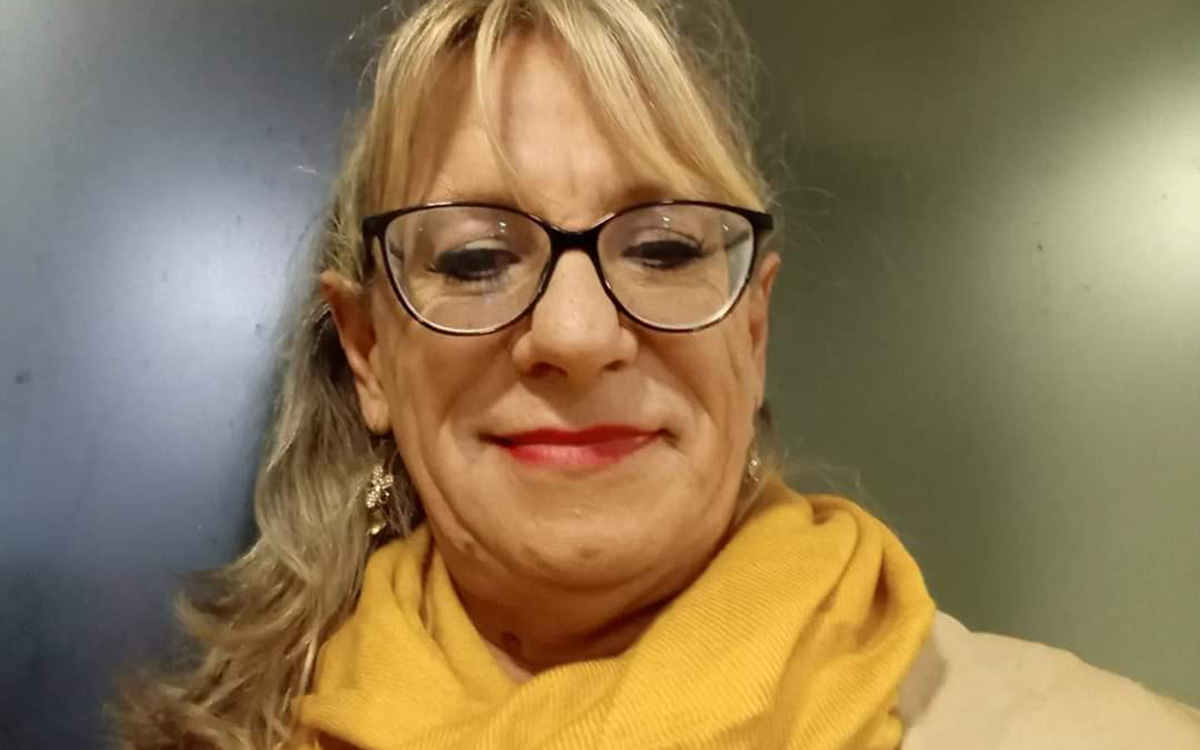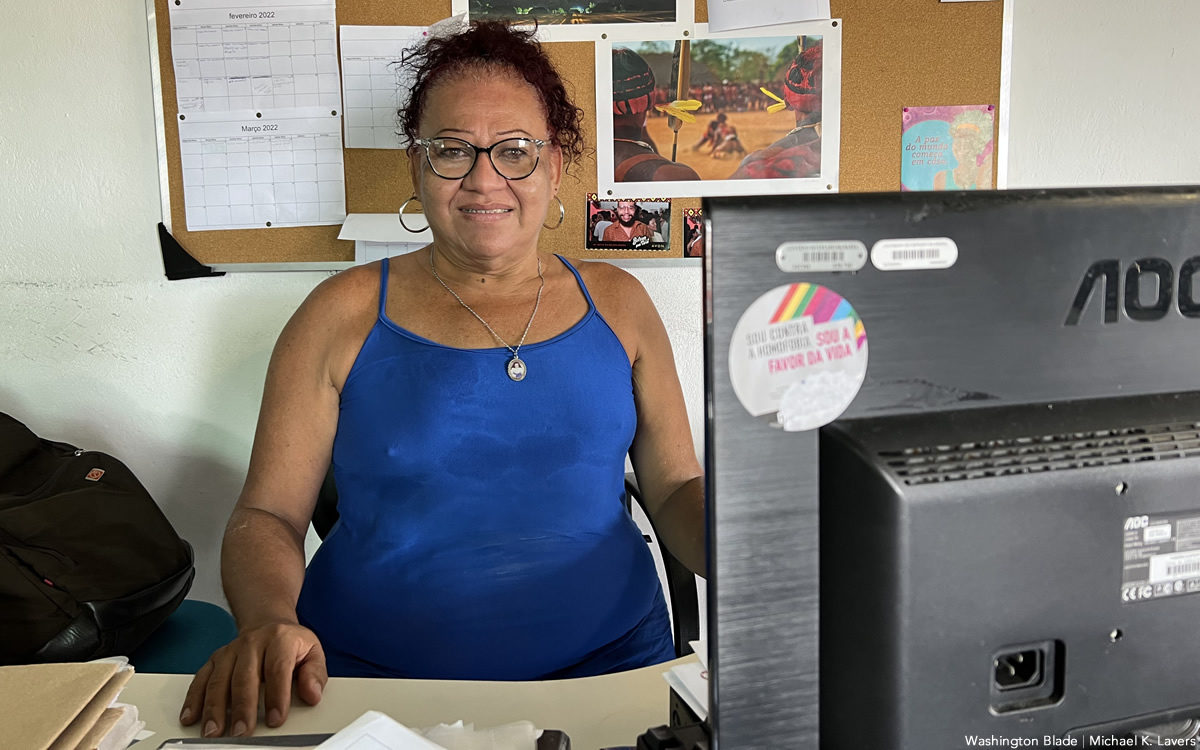Latin America
U.S. announces more funding to fight HIV/AIDS in Latin America
Jill Biden made announcement on Saturday in Panama

First lady Jill Biden on Saturday announced the U.S. will provide an additional $80.9 million to the fight against HIV/AIDS in Latin America.
Biden during a visit to Casa Hogar el Buen Samaritano, a shelter for people with HIV/AIDS in Panama City, said the State Department will earmark an additional $80.9 million for President’s Emergency Plan for AIDS Relief-funded work in Latin America. A Panamanian activist with whom the Washington Blade spoke said LGBTQ people were among those who met with the first lady during her visit.
Pope Francis visited the shelter in 2019.
“I’m glad we have the opportunity to talk about how the United States and Panama can work together to combat HIV,” said the first lady.
Michael LaRosa, the first lady’s spokesperson, noted Panama will receive $12.2 million of the $80.9 million in PEPFAR funding.
“This funding, pending Congressional notification, will support expanded HIV/AIDS services and treatment,” said LaRosa.
UNAIDS statistics indicate an estimated 31,000 Panamanians were living with HIV/AIDS in 2020. The first lady’s office notes the country in 2020 had the highest number of “newly notificated cases of HIV/AIDS” in Central America.
The first lady visited Panama as part of a trip that included stops in Ecuador and Costa Rica.
The Summit of the Americas will take place next month in Los Angeles. The U.S. Agency for International Development and PEPFAR in April announced they delivered more than 18 million doses of antiretroviral drugs for Ukrainians with HIV/AIDS.

Latin America
Protests, demands for rights define Pride month in Latin America
More than 3 million people participated in São Paulo march

Activists across Latin America marked Pride month with massive demonstrations, cultural activities, and demands that their countries guarantee equality and protect LGBTQ people from violence.
From Santiago, Chile, to Mexico City, activists took to the streets to celebrate the rights that have been won and the many that are still pending.
Chile
The Pride march that the Movement for Homosexual Integration and Liberation (Movilh) and Fundación Iguales organized took place in downtown Santiago, the country’s capital, on June 22. Authorities and the two organizations say more than 120,000 people participated.
Under the slogan “Pride with memory and hope,” marchers demanded lawmakers approve a bill that would allow reparations for LGBTQ Chileans who Gen. Augusto Pinochet’s dictatorship targeted. There were also calls for the government to promote an LGBTQ-inclusive educational reform.
“This time we are marching on high alert,” said Movilh spokesperson Javiera Zúñiga. “For the first time in decades, we are losing achieved rights. We demand the state wake up. The reform of the Zamudio Law has been stalled for 13 years.”
Marches also took place in Valparaíso, Antofagasta, Temuco, and Concepción, highlighting the growing visibility of transgender groups and feminist organizations.
Mexico
Mexico City on June 29 was the epicenter of one of the region’s largest Pride marches.
More than 300,000 people participated in the march. Comité IncluyeT organized the 46th annual march under the slogan “Not one step back: rights are respected.”
Several organizations denounced the increase in hate crimes — Mexico’s National Observatory of Hate Crimes notes more than 80 LGBTQ people have been reported murdered in the last year. They also urged Mexican lawmakers to criminalize transfeminicides across the country.
Argentina
Although Buenos Aires’s official Pride march takes place in November, the Argentine LGBT+ Federation and other groups in the Argentine capital and in other cities across the country in June organized activities.
More than 5,000 people on June 24 marched from Plaza de Mayo to the Argentine Congress to reject the government’s dismantling of public policies. President Javier Milei’s decision to eliminate the country’s Women, Gender, and Diversity Ministry and cut sexual health programs were among the moves the protesters denounced.
“Today Pride is also resistance to the adjustment,” pointed out Comunidad Homosexual Argentina, an LGBTQ advocacy group.

Colombia
Thousands of people in Bogotá, the Colombian capital, and the cities of Medellín, Cali, and Barranquilla marched on June 29.
The marchers’ slogan was “diversity is also peace,” in a context where violence against LGBTQ people remains high. Caribe Afirmativo, a Colombian LGBTQ rights group, notes more than 45 people from the community has been reported killed in the country over the last 12 months, with most of them trans women.
Organizations also demanded lawmakers resume debate of a bill that would extend comprehensive protections to LGBTQ Colombians. The measure has been stalled in Congress since 2023.
Brazil
More than 3 million people participated in the 28th São Paulo LGBTQ+ Pride Parade that took place on the city’s Paulista Avenue on June 22.
The parade took place under the slogan “LGBT+ social policies: we want the whole thing, not half of it.” Organizers demanded expanded access to health care, employment, and education for the most vulnerable communities, especially Black trans people. They also denounced ultraconservative figures who seek to curtail LGBTQ rights.
Peru and Paraguay
More than 15,000 people took part in a Pride march in Lima, the Peruvian capital, on June 28. Participants demanded lawmakers approve a trans rights law, which has been stalled in the Peruvian Congress since 2016, and recognition of civil unions.
Members of SomosGay, a Paraguayan LGBTQ rights group, and other organizations participated in a Pride march that took place in Asunción, the country’s capital, on June 29.
The march took place without incident, despite threats and anti-LGBTQ hate speech on social media. Participants demanded an end to anti-LGBTQ discrimination and rhetoric from social and religious groups.
Central America
Upwards of 2,000 people participated in a Pride march in Tegucigalpa, the Honduran capital, on June 22. A Pride demonstration took place in San Salvador, the capital of neighboring El Salvador, on June 28.
Latin America
LGBTQ cruise ship rescues 11 migrants between Cuba and Mexico
Rescue took place in Yucatán Channel on Wednesday

A cruise ship chartered by an LGBTQ travel company on Wednesday rescued 11 Cubans from a boat that was adrift between their country and Mexico.
Vacaya in a press release said the Royal Caribbean’s Brilliance of the Seas, which had left from New Orleans, discovered the migrants’ boat in the Yucatán Channel, a strait between Mexico and Cuba that connects the Gulf of Mexico (the Trump-Vance administration now refers to the body of water as the Gulf of America) and the Caribbean Sea.
A video that Vacaya provided shows the migrants’ boat before the rescue. Other videos show the rescue taking place.
MTV’s Downtown Julie Brown, who was performing on the ship, described the rescue in a video she posted to social media.
“We are in the middle of a live rescue operation right now,” she said. “The captain of the ship, while we were hauling so fast the other way, thought he saw a boat in distress. So, we looped around … and it was indeed a boat in distress.”
“Nothing speaks more to VACAYA’s values than providing comfort in a moment of need,” said Vacaya CEO Randle Roper in the press release. “I’m so happy we were able to bring these 11 refugees onboard safely and provide medical care, dry clothes, food, and, most importantly, water.”
“It’s sad that some people have to put themselves through such trauma in hopes of finding a better life, but that’s where we are today,” added Roper. “I’m so proud of our LGBT+ guests rallying to collect clothes for these fellow humans in need.”
The ship is scheduled to return to New Orleans on Saturday.
Latin America
Latin America elections present challenges, opportunities for LGBTQ community
Voters in Chile, Uruguay, Brazil, Venezuela to go to polls this year

Activists throughout the region agree the elections offer a crucial opportunity to advance the inclusion and protection of the rights of their community amid far-right advances.
Venezuela’s presidential election will take place on July 28, while Brazil’s municipal elections will happen on Oct. 6. Regional and municipal elections will take place in Chile on Oct. 27. Uruguay’s congressional elections are slated to occur on the same day.
María José Cumplido, executive director of Fundación Iguales in Chile, emphasized the importance of having LGBTQ representation in politics.
“It is fundamental because LGBTQ+ people tend to support laws or public policies aimed at protecting the community,” Cumplido told the Washington Blade. “In that sense, it is important that the voices of these people are heard because, obviously, they know the reality more closely and many times they have lived it.”
Cumplido noted “LGBTQ+ representation has grown notoriously in recent years, so much so that today there is an LGBTQ+ caucus in Congress.”
“That is good news,” said Cumplido.
Ignacia Oyarzún, president of Organizado Trans Diversidades (Organizing Trans Diversities or OTD), also from Chile, highlighted the observation and registration work the Trans Voting Observatory of Latin America and the Caribbean has done. Oyarzún also noted the promotion of transgender candidates as a way to combat misinformation a promote respect for the community’s political rights.
“We monitor the situation of the political rights of our communities in the region and establish guidelines through which we encourage respect for the right to elect representatives and to be elected,” said Oyarzún. “We also maintain initiatives that have to do with the dissemination of trans candidacies and news that go against the disinformation established through false news that have begun to circulate through the various social and political media.”
Collette Spinetti, president of the Colectivo Trans del Uruguay, pointed out the challenges faced by LGBTQ people in politics, especially trans people.
“The biggest challenge is to achieve trustworthiness especially towards gender-dissident people in their ability to be able to hold public office,” said Spinetti.

“In Uruguay politics is still quite macho, especially in the so-called traditional and right-wing parties where there is no political representation of members of the LGBTIQ+ community,” Spinetti further explained. “On the left, although there is, thanks to internal work, female representation, there is still a lack of work.”
“In this sense the scarce LGBTIQ+ representation is present through gay men,” added Spinetti. “There is still no representation of publicly lesbian people and only one representation in the interior of the country of a trans woman.”
In Brazil, Keila Simpson, president of Associaçao Nacional de Travestis e Transexuais (National Association of Travestis and Transsexuals or ANTRA), highlighted the diversity of LGBTQ representation in the country’s politics. Simpson nevertheless recognized the importance of mandates that go beyond identity and address a wide range of issues that benefit the entire community.
“The challenges for LGBTQIA people when it comes to applying for positions in Brazil are many,” she said. “The first one is the way Brazilian society sees this stigmatized and completely stereotyped population. If we think about the trans population, this violence is even greater, since in addition to being smaller in number, the discrimination is even greater because this population is commonly associated with eroticism and hypersexualization of their bodies, and these are the main problems these people face. they are associated when they run for prominent positions or leaders, even in the partisan political arena.”

In Venezuela, Richelle Briceño, a trans woman and former congressional candidate, on the other hand, lamented the lack of presidential candidacies that explicitly defend LGBTQ rights. She noted the country still faces fundamental challenges that prevent a serious debate on these issues.
“There are candidates who have expressed themselves against non-discrimination, but that’s as far as it goes,” Briceño recounted. “There are no specific candidates that I can tell you who even handle what the definition of the word queer is and how it is understood, let’s say, within LGBTQ+ activism.”
Briceño said María Corina Machado, an opposition leader who President Nicolás Maduro’s government has barred from running for office, has “come out in favor of issues such as equal civil marriage and the issue of recognition of trans identities.” Briceño noted to the Blade that Edmundo González Urrutia, who is running as her surrogate, did not meet with LGBTQ activists until last week.
“These activists exposed their points of view, however, the current candidate leading the polls has not made a public statement regarding his position or what his position will be on the issues of LGBT rights in Venezuela,” said Briceño.
Briceño further stressed that Venezuela “is still in a cave.”
“Here the country is in the basics, the country is in not losing electricity, in having water and in seeing how people eat daily,” she said. “The political and economic crisis that we have lived through for two decades, and with more depth in the last decade, has not allowed for a serious debate on the issues of the 21st century, including the rights of sexual diversity populations or the LGBT population and women”.
José Rodríguez, a Venezuelan psychologist who, like many of his compatriots had to leave his country, said that “as a young Venezuelan exiled in Chile for eight years, today I feel the tranquility of living in a society where a governmental interest in the welfare of my community is appreciated, expressed by a legal framework that although it could be better; compared to the overwhelming setbacks that have occurred in recent weeks in neighboring countries and the constant lethargy of Venezuela in terms of advancing the LGBTQIA+ agenda, is deeply painful and worrying.”
-

 Federal Government1 day ago
Federal Government1 day agoTreasury Department has a gay secretary but LGBTQ staff are under siege
-

 Virginia2 days ago
Virginia2 days agoDefying trends, new LGBTQ center opens in rural Winchester, Va.
-

 District of Columbia1 day ago
District of Columbia1 day agoGay GOP group hosts Ernst, 3 House members — all of whom oppose Equality Act
-

 Opinions3 days ago
Opinions3 days agoUSAID’s demise: America’s global betrayal of trust with LGBTQ people








